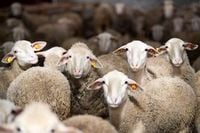Spanish livestock exporters are calling on their government to urgently intervene and open new markets for their products, particularly after facing significant obstacles in exporting to traditional destinations like Morocco. The organization "Apag Extremadura Asaja," which represents thousands of farmers and livestock breeders in the Extremadura region, has emphasized the necessity of diversifying trading partners to ensure the sustainability and competitiveness of the sector.
In a recent statement, Apag Extremadura Asaja urged the Spanish Ministry of Agriculture to take concrete steps to facilitate the export of sheep to Algeria. They highlighted the need to expedite the issuance of the Required Sanitary Examination (ASE), a crucial condition for entering the Algerian market. The organization believes that this measure could revitalize the sector, especially after the challenges faced by Spanish exports to Morocco.
Raul Mosiir, the head of the professional association for sheep and goat meat, reiterated the sector's reliance on the resumption of live sheep exports to Morocco in the future. He noted that shipments had been completely halted following a royal directive from King Mohammed VI that canceled the traditional practice of sacrificing animals for Eid al-Adha this year. Mosiir pointed out that the Moroccan market previously received between 10,000 to 15,000 sheep weekly, making the sudden decision particularly surprising and detrimental to Spanish exporters.
The Moroccan royal decree to suspend the sacrifice was issued in response to economic pressures, with the king stating that it aimed to relieve citizens amid soaring livestock prices. The decision was met with widespread approval among Moroccan families, as it alleviated financial burdens on middle and low-income households and contributed to stabilizing meat prices in local markets.
In light of these developments, the livestock sector in Spain is in dire need of sustainable solutions to compensate for losses in traditional markets by exploring new export avenues. This approach is vital to mitigate the impacts of economic and climatic crises that have affected demand in neighboring countries.
Meanwhile, on the other side of the globe, the Australian government has projected a 6% decrease in mining and energy export revenues during the current fiscal year, which ends in June. This decline is attributed primarily to a drop in iron ore prices, a key pillar of the Australian economy. Government reports indicate that the value of exports is expected to fall from 415 billion Australian dollars last year to 387 billion Australian dollars.
According to the Australian Ministry of Industry, the value of live cattle exports is anticipated to decrease to approximately 343 billion Australian dollars over the next five years. This expected decline is part of a broader trend that has seen prices begin to fall since 2021 due to international factors, including the impacts of the COVID-19 pandemic and the ongoing war in Ukraine.
The challenges facing the iron ore export sector are considerable. Notably, there has been a 14.8% decrease in Chinese demand for iron ore shipments as of February, coupled with an increase in global supply that has outpaced demand, leading to lower prices. Despite these setbacks, iron ore remains a crucial component of Australia's mining sector.
Several factors have contributed to the financial downturn in Australia's energy exports. These include a decline in the value of the US dollar, which has negatively impacted export prices, and a slowdown in industrial activities in major importing countries like China. Additionally, the global supply of energy has increased, further contributing to the reduction in prices.
Looking ahead, the Australian government report suggests that while export revenues may not return to previous levels quickly, market stability could enhance the future performance of the Australian economy. The report anticipates that the market will adapt by relying on local supply while gradually reducing exports. Despite the immediate challenges, there is hope that price stability will support economic resilience in the long run.
As both Spain and Australia navigate their respective challenges in the livestock and mining sectors, the need for strategic adaptations and new market opportunities has never been more pressing. The ability to diversify export destinations and respond to changing economic conditions will be crucial in sustaining these vital industries.


